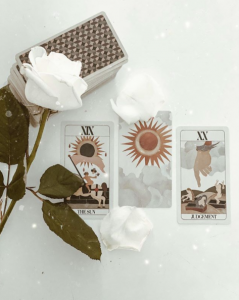The Enneagram: An Opportunity to Get to Know Yourself

From the ancient Greek maxim “Know thyself,” to Shakespeare’s insistence “Above all: To thine own self be true,” people have been questioning who they are at their core for centuries. In modern times, those seeking more meaningful self-insight often turn to means like therapy and a host of personality quizzes and assessments online.
Have you ever been curious about how “bro” you are? Or what kind of bitch you are? There’s a quiz for that. Ahh, the spoils of the internet. But aside from the battery of Buzzfeed and Buzzfeed-adjacent tests, there are other more legitimate avenues to pursue on your path to self-discovery via laptop. Some of the most popular ones include the Myers-Briggs Type Indicator, the DiSC profile—and the Enneagram.
“The Enneagram shows our ego’s coping addictions wrapped up around our childhood wounds—if we have the courage to be honest about these coping addictions as distractions then this can lead to transformation,” says Chris Heuertz, co-founder of Gravity, a Center for Contemplative Activism and author of The Sacred Enneagram. “Using it is the process of waking up and seeing what our soul’s purpose is.” Heuertz, also an International Enneagram Association Accredited Professional and Enneagram coach, spends much of his time traveling and teaching people how to integrate the Enneagram into their lives and relationships.
The Enneagram of Personality, commonly referred to as the Enneagram, is a model of personality types. Though its origin is contested—some claim it is rooted in Egypt—generally, Oscar Ichazo is credited with conceiving the word Enneagram, developing the concept, and teaching the principles. The Enneagram is structural. It has a circle, an inner triangle, and a hexagon. The ring explains how the different personalities unite while the triangle shows how three nearby characters may influence each character.
“There’s a responsibility that comes with the Enneagram, dealing with people’s psyche and ego—this isn’t just a game,” says Heuertz. And while it may look simple enough, the Enneagram is actually quite complex. “Though there are nine personality types, there are actually up to 108 renderings if you account for 27 instinctual variants and subtypes with their possible wings.”
The basic nine personalities are:
1. Reformers
Ones are principled, value integrity and want to lead by example. They are objective and able to see and judge details, people and situations without emotion. Ones are also reliable and responsible, like opportunities to structure things and are detail-oriented.
2. Helpers
Twos are demonstrative and have a warm nature that makes them generally very likeable. Caring and giving, they are people-centered and can anticipate the needs of others. Twos readily offer praise to others and have a tendency of putting their own needs and feelings aside.
3. Achievers
Threes are ambitious and strive to be the best at whatever they take on. Resourceful and efficient, they adapt to different situations, people or environments with ease. Threes are focused on the end-result and their enthusiasm gets things done and pushes others to perform as well.
4. Individualists
Fours are aware of their own emotions and those of others, allowing them to make deep connections. Purpose-driven and creative, they want to contribute to the world and leave a unique mark. Fours are also sensitive but don’t run from painful aspects of the emotional world, allowing them to ask difficult questions.
5. Investigators
Fives are perceptive and can offer insightful observations of situations. Their interests and intellectual ideals allow them to and build expertise in many fields. Unsentimental and self-sufficient, fives will protect their autonomy and prefer to ask little of others. Their unconventional ideas enable them to be highly inventive.
6. Loyalists
Sixes are committed to what they value and often courageously take a stand on behalf of the greater good, despite concerns and risks. They are prepared and look out for risks and threats. Once sixes make a decision they stick to it and enjoy group and team environments.
7. Enthusiasts
Sevens focus on what brings joy and allows them to exude optimism. They adapt in the face of change and challenges and have visionary qualities that enable them to both anticipate and create an exciting future. Sevens are practical yet adventurous, savour their freedom and like to explore new territories and experiences.
8. Challengers
Eights are confident, direct, and quick to make decisions. Under their toughness, they have big hearts and protect the people and things they care about. Eights don’t like depending on others and have their own way of taking charge, which includes the capacity to influence the bigger picture.
9. Peacemakers
Nines are peaceful and easy to get along with. They can understand multiple perspectives and find commonalities across differences. Nines are patient, supportive and genuine, making those around them feel heard and accepted and at ease.
In today’s attention economy, the Enneagram is also seen as a correction, a return to compassion for ourselves and others. By learning about the motivators and compulsions that drive our basic fear, we can come up with a solid framework for why behave the way we do. “Personality is a mask we wear,” says Heuertz. “So many of us have curated these digital brands through our social media feeds and so much effort is put into that that we forget who we are because we’ve polished this image of who we want to be. But the texture of the complexity of our humanity is ascending.”
Get a FREE, 3 minute Astrologer chat. Connect now.



